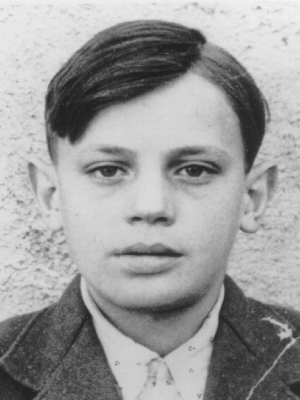
Samuel, the son of Aron and Jaffa Oliner, grew up on his grandparents' farm in eastern Poland. His father owned some land in the area and ran a small general store. Samuel had an older brother and sister. Samuel's mother died when he was seven, and his father moved away and remarried, leaving Samuel with his maternal grandparents. When the Germans occupied Poland, Samuel was a nine year-old schoolboy. The Nazi occupation was harsh. The Germans immediately began brutalizing Jews. Jews were forced to wear the yellow star, their property was confiscated, and they were subjected to random brutality and murder. Ten year-old Samuel decided to live with his father, stepmother, young stepbrother and baby stepsister.
In July 1942, Jews living in rural villages were forced to leave their homes and move into sealed-off ghettos. Samuel and his family moved to Bobowa, a small town that was 80 percent Jewish. The ghetto was overcrowded, filled with disease-carrying vermin, had little sanitation, very little food, and no medicine. The Germans entered the ghetto at will, randomly brutalizing the residents and taking away the young men, girls, and skilled workers. Many died of starvation and disease. Samuel would often sneak out of the ghetto to bring food back to his starving family.
On August 14, 1942, the Germans rounded up all the remaining residents of the ghetto and murdered them in a nearby forest. Urged on by his stepmother, twelve year-old Samuel escaped into the countryside. After walking for two days, he found refuge with a friendly peasant woman who risked her life by teaching him how to pass as a non-Jew. Samuel was given a new name, different clothes, and was taught to read in Polish and recite the catechism. When he was ready, Samuel left her home to seek work in a village where he was not known. He found work tending cows on a farm. The Polish couple who lived there had moved from the city and rented the formerly Jewish-owned farm from the Germans. They knew little about farm work and needed help. Samuel lived there for three years. Constantly faced with the threat of discovery, Samuel carefully concealed his origins. In March 1945, the Russian army pushed the Germans out of the region. At first, fifteen year-old Samuel was afraid to reveal his true identity, but when other Jewish survivors came out of hiding, he left the farm and joined them. He hoped to find his family, but Samuel soon learned that he was the only survivor.